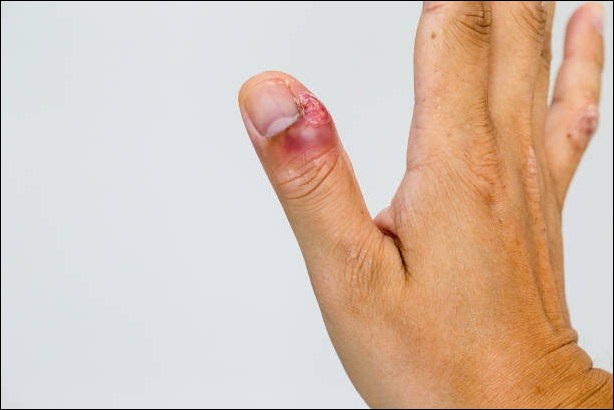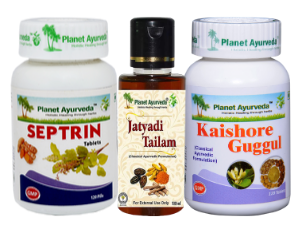What Is Paronychia And Its Treatment With Ayurveda
Abstract
Nails are often considered trivial and a symbol of beauty. However, they serve a much more important purpose for the human body. They are often taken for granted but they help us dig, open, scratch, pick, throw, and support fingers and toes. While nails serve multiple purposes, they are vulnerable to infections and damage. These infections if left untreated can severely damage nails and underlying skin. In this article, we will take a look at paronychia, a kind of nail infection, and ways to treat it with Ayurveda.

Introduction
Paronychia is a condition where the nail is inflamed as a result of trauma, irritation, or infection. It usually affects the fingernails or toenails of the feet. This condition is usually the result of bacterial or fungal infection. Bacteria enter the broken skin near the cuticle and nail fold and eventually cause an infection. Depending on the cause of the infection, paronychia may arise gradually and last for weeks or sometimes show up suddenly and last for only a few days. It is of two types:
1) Acute: Develops quickly and lasts for only a few days.
2) Chronic: Develops gradually and lasts for weeks.
Causes: Most common causes are:
- Bacterial infections such as Streptococcus, staphylococcus
- Yeast infections such as Candida
Causative organisms often end up entering the skin through
- Cuts
- Ingrown nails
- Irritation from chemicals
- Trauma to cuticle
Symptoms
Symptoms for both acute and chronic paronychia are very similar. Some of the common symptoms are
- Redness of the skin around the nail
- Tenderness
- Pus Blisters
- Altered nail texture
- Detached nail
Treatment
Treatment for paronychia depends upon the cause and the severity of the disease. Commonly used treatment methods are:
- Antibiotics for bacterial infection
- Antifungal for fungal infection.
- Pus drainage in case of abscess
- Surgical removal of a part of the nail (in severe cases)
Ayurvedic perspective on Paronchyia
Nails in Ayurveda are considered to be a by-product of bones (Asthi Dhatu) and are developed in the Tritiya avastha peak (third phase of digestion). Ayurveda refers to paronychia as ‘Kunakha’. Kunakha means Ku (bad) and Nakha (nail).So it is referred to as a condition that results in bad nails. Ayurveda considers this condition as pitta dominant and tridosha condition. Washermen, hospital workers, and cleaners are the common sufferers of this problem. Ayurveda mentions various herbs and oils that help in the treatment of paronychia. The treatment for paronychia in Ayurveda is based on the following lines and principles:
- Shothara (Anti-inflammatory)
- Pittahar (non-septic)
- Shoolhara (anti-inflammatory)
Ayurveda herbs that help in paronychia
Ayurveda classical textbooks mention various herbs and formulations that help in the healing of the affected nail and promote the recovery of paronychia. Once the root cause is assessed, both external and internal treatment is recommended according to Ayurveda. All the herbs used in Ayurveda for paronychia have anti-fungal, anti-inflammatory, immune modulator, anti-bacterial and anti properties. Some of the common herbs used are:
- MANJISTHA (Rubia cordifolia): The herb Manjistha (Rubia cordifolia) mentioned in classical Ayurveda texts is an excellent herb for all skin diseases. It has anti-inflammatory, antibacterial, and antioxidant properties. It is a natural blood purifier, inhibits the acne causing bacteria, and heals the wounds. It has a bitter-sweet taste and is considered ‘Varnya’ (good for skin) in Ayurveda.
- GUDUCHI (Tinospora cordifolia): Guduchi (Tinospora cordifolia) is one of the most used Ayurveda herbs for its immune-boosting properties. Along With immunity, it also has cooling and pitta-balancing properties which help relieve skin irritation, and inflammation and promote healthy skin. It has a sweet vipaka (post-digestion taste) and helps in relieving itching and redness.
- NEEM ( Azadirachta indica): Neem (Azadirachta indica) is a medicinal herb that is excellent for skin issues. It has anti-inflammatory properties and healing properties. It has Nimbin that prevents skin problems like acne, blisters, etc. This herb is bitter in taste and is considered as Kandu Ghana in Ayurveda which means herbs that help in itching and skin disorders.
- KHADIR (Acacia catechu): Acacia catechu is an Ayurveda herb that finds its mention in Charak Samhita, one of the most ancient Ayurveda classical textbooks. It has both antibacterial and antifungal properties; it inhibits the growth of both bacteria and fungi and is hence considered the best to treat paronychia.
Herbal Formulations for Paronychia by Planet Ayurveda
Planet Ayurveda is a GMP-certified company that manufactures pure 100% vegetarian products that are prepared by MD Ayurveda doctors. All the formulations by planet ayurveda have standardized extracts of natural herbs. All the formulations by Planet Ayurveda are free from preservatives, starch, additives, yeast, or added flavors. These products are free from sulfates or parabens. Planet Ayurveda formulations that help in the case of paronychia are mentioned below
Product List
1. Kaishore Guggul
2. Septrin Tablets
3. Jatyadi Oil
Product Description
1. Kaishore Guggul
Kaishore guggul by Planet Ayurveda is a tablet formulation that contains various Ayurveda herbs such as Guggula (Commiphora mukul), Guduchi (Tinospora cordifolia), Goskhur (Tribulus Terrestris), Vidang (Emelia tribes) and Trikatu (Three peppers). Guggul-the key ingredient in this tablet helps majorly in fighting the disease and reducing inflammation and healing the skin wounds.
Dosage: 2 tabs twice daily
2. Septrin Tablets
Planet Ayurveda’s Septrin tablets are a formulation that has pure Ayurveda herbs. Some of them are Guggul (Commiphora mukul), Haldi (Curcuma longa), Tulsi (Ocimum sanctum), Sonth (Zingiber officinale) and Marich (Piper longum). All these herbs are anti-inflammatory, and anti-bacterial, and have healing properties which make this combination good for the treatment of paronychia.
Dosage: 2 tabs twice daily
3. Jatyadi Oil
Jatyadi oil by Planet Ayurveda is an oil-based formulation made with many Ayurveda herbs that help with skin disorders. Some of them are Chameli (Jasminum officinale), Neem (Azadirachta indica), Mulethi (Glycyrrhiza glabra), Turmeric (Curcuma longa), manjistha (Rubia cordifolia) and many other. All these herbs have skin-healing properties and anti-inflammatory action. Jatyadi oil is mixed with Dashang Lep and Kushta rakshasa oil.
Dosage: Locally applied over the affected nails
CONTACT PLANET AYURVEDA TO PROVIDE YOU WITH THE COSTING / ORDERING AND DELIVERY INFORMATION AT – COSTING.PLANETAYURVEDA@GMAIL.COM OR CALL AT +91-172-5214040
Conclusion
Nails may seem like a trivial part of the human body but they reflect the overall health of our body and hence it is very important to maintain the health of nails. Paronychia if left untreated can cause complications and hence it is important to treat recurrent chronic paronychia. Although modern medical science provides treatment for paronychia, but in the case of chronic paronychia it is always better to look out for natural Ayurveda options that help heal the issue permanently.




